Heat pumps are essential devices in cold regions. This technology is more helpful than regular ventilation, heating, and air conditioning (HVAC) systems. Heat pumps move air from one space to another. Hence, there is no need for fossil combustion. Other than that, you can also enjoy improved comfort, cleaner air, and less energy use.
One issue you will mostly face is trying to pick between geothermal and heat pumps. We will state all you need to know about air-source heat pumps vs. geothermal heat pumps to make an informed decision. Our article will help you decide which heat pump you must choose for your home.
Key Takeaways
– Geothermal heat pumps are more efficient because they use the earth’s natural heat to keep your home comfortable, while air source heat pumps rely on external air sources like the sun or wind.
– However, air source heat pumps are less expensive to install and maintain, so it really depends on your specific needs.
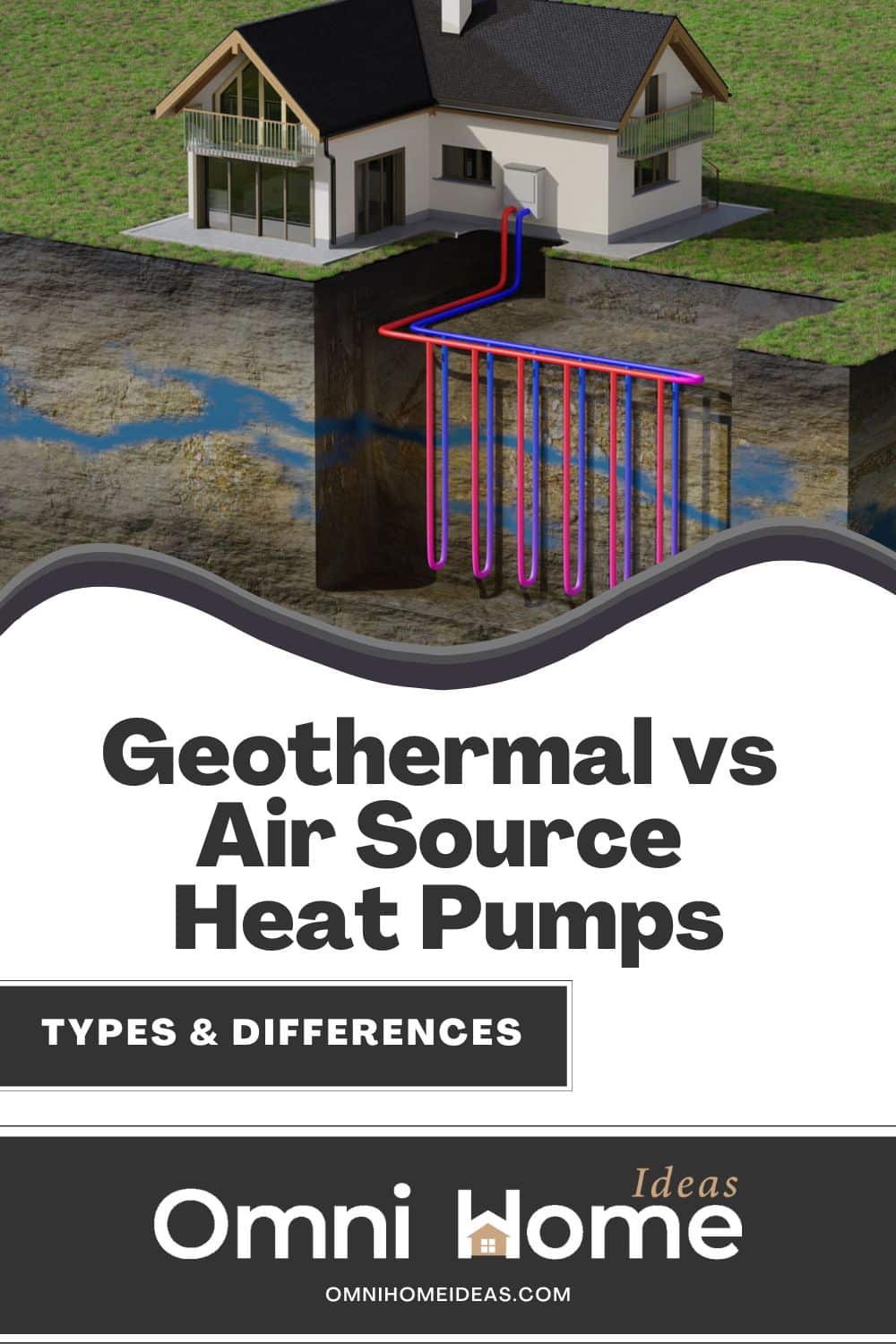
For several reasons, picking between an air source and a geothermal heat pump system is challenging. First, you will have to consider the cost of installation, the maintenance cost, the type of building, and other factors.
What we can say, however, is that these two heat pump systems offer outstanding heat or cold air to their users. You can pick any of these systems based on your budget and preference. After surveying your building or open space, you can let your electrician decide which system would work best for you.
About Air Source Heat Pumps
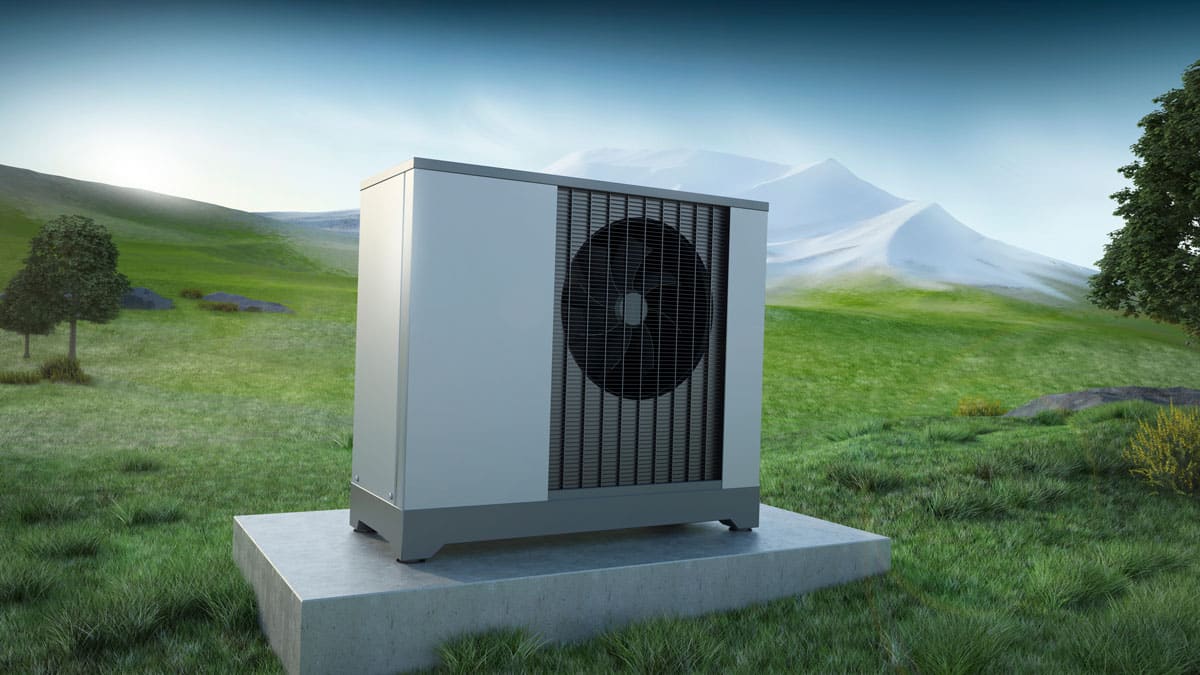
Air source heat pumps have efficient cooling and heating mechanisms for your home. Air-source heat pumps offer thrice as much heat energy if installed properly. Unlike fuel-like combustion heating systems, air-source heat pumps transfer heat instead of converting heat.
Many people in the United States use air-source heat pumps for their homes. Before, people in areas with sub-freezing temperatures could not use air-source heat pumps. However, thanks to new advancements, it is now possible to use this technology in these areas.
Types of Air-Source Heat Pumps
There are several air-source heat pump types. These air-source heat pumps include:
Ducted vs. Short-Run Ducted vs. Ductless
Ducted air-source heat pumps usually use ductwork in their system. You can consider this system if your home’s ventilation has new construction or if you already have a working ventilation system. The short-run ducted system uses extensive ductwork that runs through a small fraction of your house. This system often uses other ductless units to support the rest of the house.
Ductless systems, on the other hand, use minimal construction to function. You only require a three-inch hole through your wall to connect the indoor heads to the outdoor condenser. Moreover, you will have to install ductless systems to support this technology.
Split and Packaged Air-Source Heat Pumps
Packaged air-source systems typically have coils and fans outdoors. The system delivers cooled or heated air to the interior of your home via ductwork through a roof or wall. While packaged systems are efficient, most air-source technologies come as split systems.
In the split system, you will find one coil on the outside and one on the inside. Additionally, return and supply ducts connect to the indoor central fan of your split system.
Single-Zone and Multi-Zone Air-Source Systems
You can use single-zone air-source systems for single rooms. In such an instance, you only need to connect one indoor head to an outdoor condenser. On the other hand, multi-zone installations have two or more indoor coils that connect to an outdoor condenser.
The multi-zone indoor coils usually vary in size and style. Additionally, each of these coils creates its own comfort “zone” to cool or heat individual rooms, open spaces, or hallways.
About Geothermal Heat Pumps
Geothermal heat pumps (GHPs), also known as GeoExchange, are ground-source, earth-coupled, and water-source heat pumps. These are some of the best heating systems you can add to your home. This system uses the earth’s relatively constant temperature as an exchange medium instead of relying on the outside air temperature.
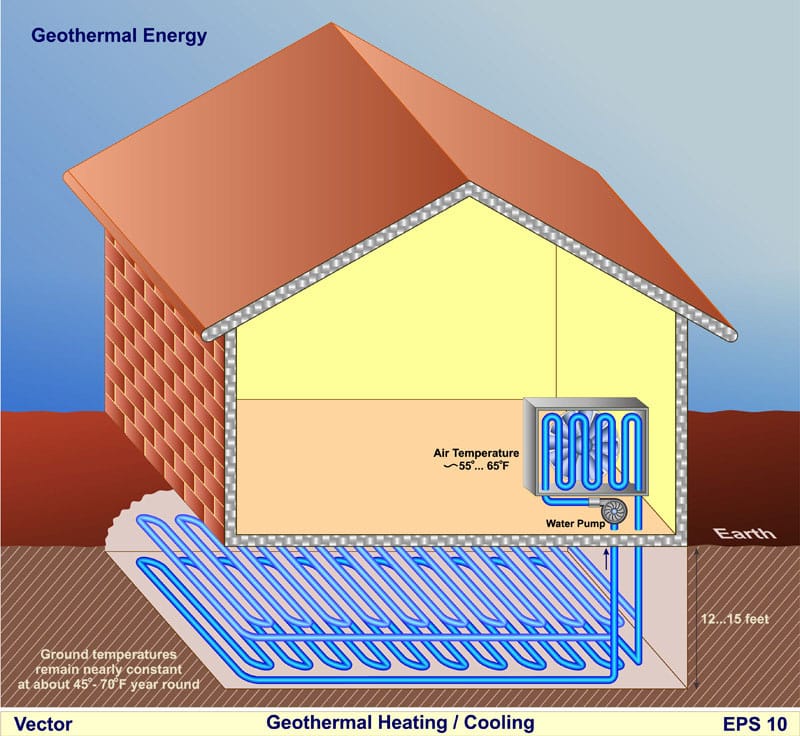
Like any other heat pump, you can use a geothermal heat pump to heat and cool your home. The system will supply your home with hot water if appropriately equipped. There are geothermal systems that have variable fans; some also have two-speed compressors for better energy savings and comfort.
Compared to air-source pumps, geothermal heat pumps are relatively quiet and last longer. Additionally, geothermal heat pumps last longer and do not need much maintenance. Geothermal heat pumps also do not depend on outside air to either heat or cool your home.
Types of Geothermal Heat Pumps
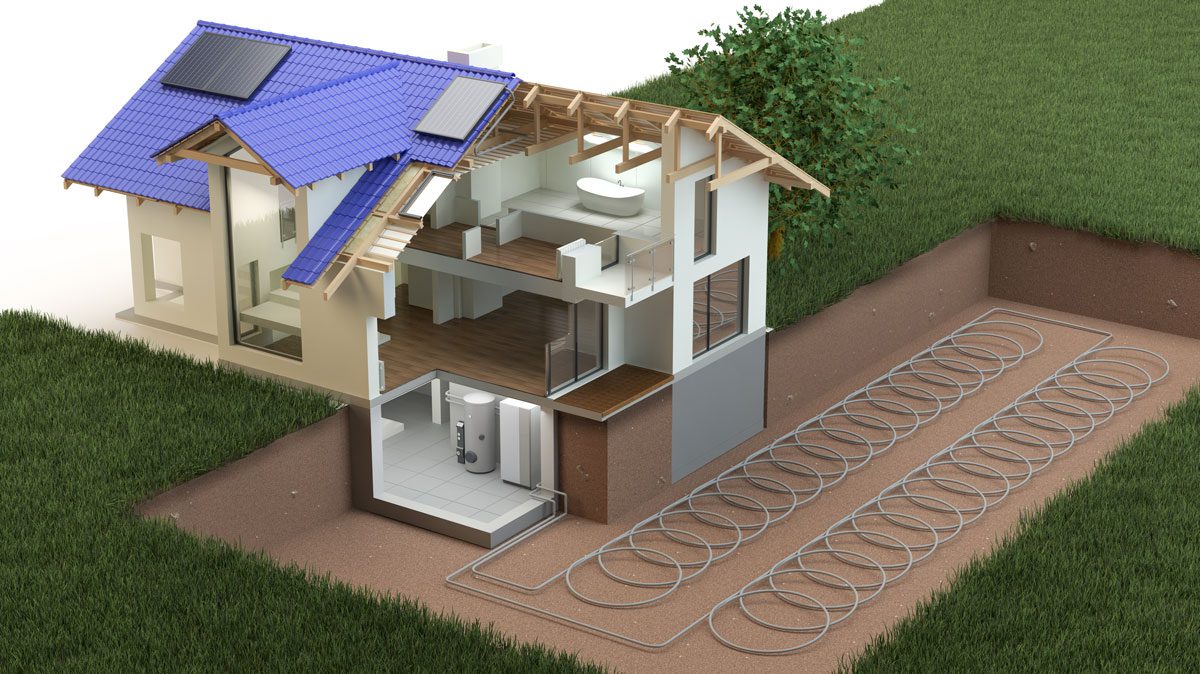
Geothermal heat pumps have four types of ground loop systems. Three systems (vertical, pond/lake, and horizontal) feature closed-loop systems. The fourth type of ground loop system is an open-loop system.
Several things, like soil condition, climate, local installation costs, and land availability, determine which loop system you can use.
Closed-Loop Systems
Almost all geothermal systems with closed-loop technologies circulate an antifreeze solution via their closed loop. This closed-loop usually consists of high-density tubing (plastic-type) submerged in water or buried in the ground. A heat exchanger delivers heat between the antifreeze solution located in the closed loop and the refrigerant in the heat pump.
One closed-loop system type, the direct exchanger, does not need a heat exchanger. Instead, the system pumps refrigerant through underground copper tubing in vertical or horizontal configurations.
Horizontal Loop System
This installation type is more cost-effective when making residential installations. You must consider this system, especially if you have new construction with sufficient land. The system requires four feet-deep trenches to function properly.
Vertical Loop System
Schools and large commercial buildings usually use this system since it does not require much land. In shallow areas that you cannot trench, vertical loops also find use. Additionally, this system does not disturb existing landscaping. All you need are 100 to 400 ft deep holes drilled 20 feet apart.
Pond/Lake
If your house or site has adequate water, it would be best to use this system to save money. All you need to do is run a supply pipeline underground from your building to the water.
Next, ensure that you coil the pipes into circles. These should be located eight feet under the water’s surface to avoid freezing during cold weather. Place the coils under a water source that meets the minimum depth, quality, and volume requirements.
Open-Loop System
Open loop systems utilize surface body or well water as the heat exchange fluid to circulate directly through the GHP system. Once circulated, the water returns to the source or surface discharge. However, you can only use this option with adequate clean water.
Similarities Between Air-Source and Geothermal Heat Pumps
Geothermal and air-source heat pumps do not have many similarities. However, it is worth noting that both systems can heat or cool your home if installed correctly. Also, both geothermal and air-source heat pumps use the same basic process. However, a geothermal heat pump uses the ground as its heat source.
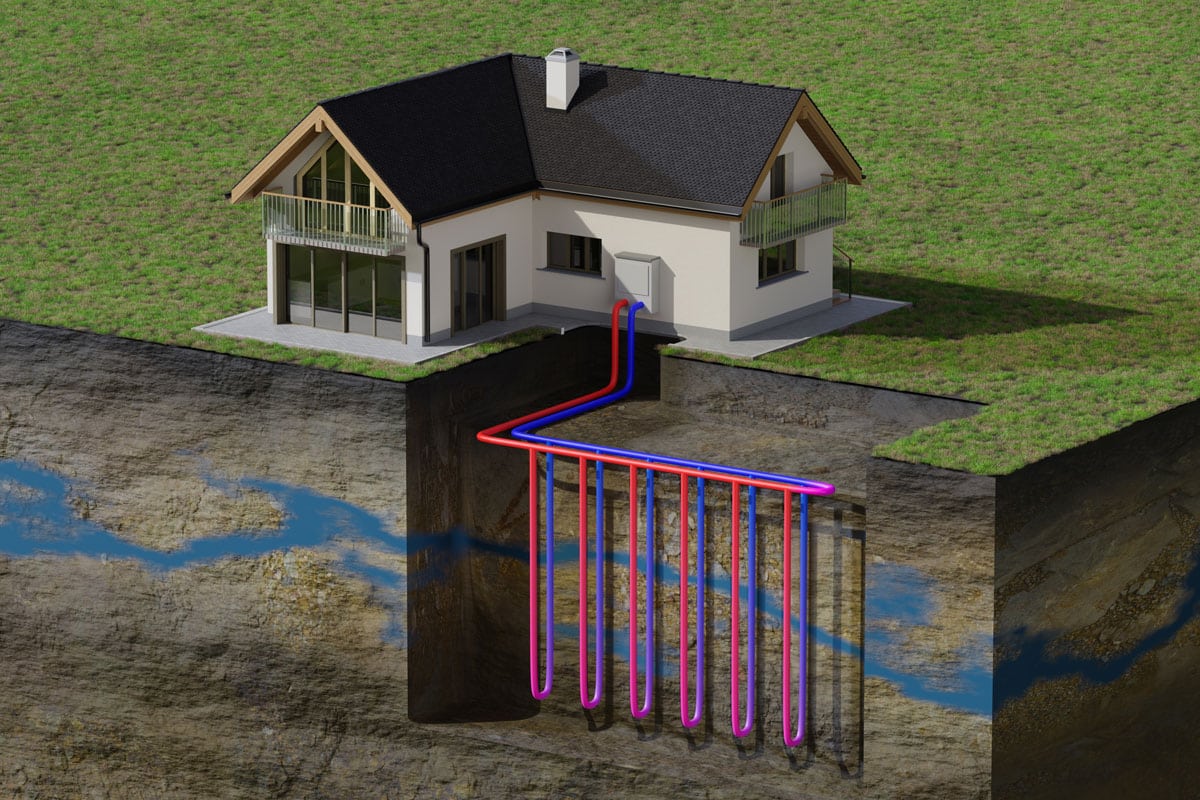
Differences Between Geothermal and Air-Source Heat Pumps
Heat pumps do not generate heat actively. Instead, these heat pumps collect and transfer heat energy from their heat source. An air-source heat pump obtains heat from ambient air via a similar process to air conditioners. However, unlike air conditioners, air-source heat pumps possess reverse valves for cooling and heating purposes.
Efficiency
The major difference between geothermal and air-source heat systems is their efficiency. Since geothermal pumps usually obtain and convey heat from the earth, they use less electricity than standard air-source heat pumps. However, geothermal heat pumps are expensive and disruptive, unlike air-source heat pumps.
Accessibility
It is mainly prohibitive to use geothermal heat pumps since you may need to drill through rock or other important areas. Unlike the geothermal option, air-source heat pumps provide a better way to install and obtain heating or cooling effects. Also, some cities may not allow you to dig into the ground for your geothermal heat pump, especially if it disrupts public property like sidewalks.
It may also require street closings in urban areas. Considering the stress needed to install a geothermal heat pump, most people prefer to use their air-source counterparts.
Flexibility
One other thing that makes these systems stand apart is their flexibility. Air-source heat pumps have a variable, multi, or mini-split refrigerant flow to deliver air directly to your apartment. Hence, tenants can easily control the temperature in their space.
On the other hand, geothermal heat pumps use ductwork and air handlers to force cold or hot air into the building through air registers. Although you can always find geothermal systems with wall units and individual thermostats, these technologies are quite expensive.
Cost
Air source heat pumps are less expensive to install than geothermal systems. They also tend to be more energy-efficient, which can save you money on your utility bills. However, they are not as effective in very cold climates and can be noisy.
Geothermal systems are more expensive to install, but they are much more efficient and can save you money in the long run. They also work well in all climates and are very quiet. The only downside is that they require regular maintenance to keep them running properly.
Conclusion
Both air-source and geothermal heat pumps perform similar functions. However, each of these heat pump systems has its advantages and disadvantages. While it is easier to install air-source systems, you will have to spend more on maintaining them.
On the other hand, geothermal systems do not cost more to install but require you to spend more during installation. It would be best to consider the area you reside in and the building type. If you have a water body with relatively clean water that can act as the source, you can opt for a geothermal heat pump. However, if you have some money to spare, you can always consider using an air-source heat pump system.


